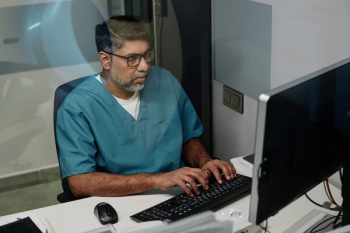
Great (or Not Quite So Great) Expectations
Expectations-both for yourself and your work environment-play a huge role in radiology.
I am writing this column less than 12 hours before the Game of Thrones series will air its finale. Even if you haven’t watched a single episode and aren’t a social-media follower, chances are you’re aware that much of the viewer-population has been, shall we say, less than thrilled with this final season. This coming week, you can expect to hear a lot more about how A) the finale completed the series’ nosedive, or B) it pulled up to some degree and managed a semi-dignified crash landing [Editor's note/opinion: The latter].
It’s not entirely the show-creators’ fault. They did a better job in earlier seasons, and the viewers’ expectations were thus raised. The better a job you do today, the harder you have to do tomorrow to not disappoint, let alone impress.
That goes for expectations of self, as well as it does for the expectations of others. Folks’ tendency to self-appraise varies quite a bit (and I’ve mentioned in previous columns that mine is sometimes pretty uncomfortably robust), but I think everyone “self-expects” to some degree.
For instance, I know myself to be at the low end of the spectrum when it comes to being mechanically inclined. I will thus be quite pleased with myself if I manage to fix anything that’s broken or dysfunctional, no matter how petty. And if I do a lousy job or fail entirely, I won’t beat myself up about it at all. A professional handyman, on the other hand, hopefully has greater expectations of his skills.
Greater expectations
When it comes to my own profession, of course, I’m more self-exacting. And, over the course of several years of practicing rads, I’ve seen how my self-expectations can migrate.
For instance, I’ve mentioned in older columns how my daily case-volume changed as I went from an onsite-job in an imaging center to a telerad position, covering hundreds of facilities across the country. Then, even within the telerad environment, how those volumes continued to change as I got credentialed at facilities with different case-mixes, or when I moved to a different shift that was populated by a lot more XR.
It’s very easy to lose sight of the various factors that go into such changes. I eventually was reading 2-3 times-or even more-the number of cases in a telerad shift as compared to what I’d done onsite at the imaging-center. I never completely lost sight of the various factors that made this possible (vastly improved efficiencies of the telerad company in question, for instance). Still, there was pretty much no way to avoid developing a sense that I, personally, had become more capable. Or at least more focused and industrious.
So, seven years or so later, it became my expectation that I would, given the right tools and worklist, reliably produce this greater volume. Whereas, once upon a time, I would have regarded such volumes with amazement, and probably some suspicion (how can anyone be reading that much with the same quality/accuracy?).
Now, suppose I went back to an onsite gig, complete with its inefficiencies and distractions-there’s no way I’m going to burn through as many cases as I do now. I can reassure myself of these extenuating circumstances all I want, but I know I’d be feeling crummy for not living up to the expectations I’ve come to have for myself. Even if I read half as many cases as I do in telerad-which would still be a big jump up from what I did in my last onsite job.
Such expectations are to be found all over the place-QA being another that leaps to mind. If I moved from one gig with very forgiving, even lax peers who never reported discrepancies to another environment, maybe an ivory-tower affair with academicians who liked to split hairs, I might read at precisely the same level of accuracy, but suddenly go from a < 0.01% error-rate to 1-2%, and feel lousy about it.
And speaking of such changes in venue, suppose I moved from such a top-level environment to something more down to earth, a multispecialty practice out in the ‘burbs. I might have learned to expect technologists who know all the smartest MR protocols or sono-scanning techniques-and now, suddenly doing without them, I might find myself feeling like I’ve been hung out to dry. How can you expect me to read these borderline-nondiagnostic studies and put my name on their reports?
Such expectations are best tempered against reality with reliable, objective sources. Hopefully most of the readers have a trusted colleague or three who serve well in this regard. For those of us in telerad, reading in home-offices in relative isolation, it takes a little more effort at “reaching out” (via social media, for instance, or the good ol’ telephone)-but such efforts are well worth the while.
Newsletter
Stay at the forefront of radiology with the Diagnostic Imaging newsletter, delivering the latest news, clinical insights, and imaging advancements for today’s radiologists.












